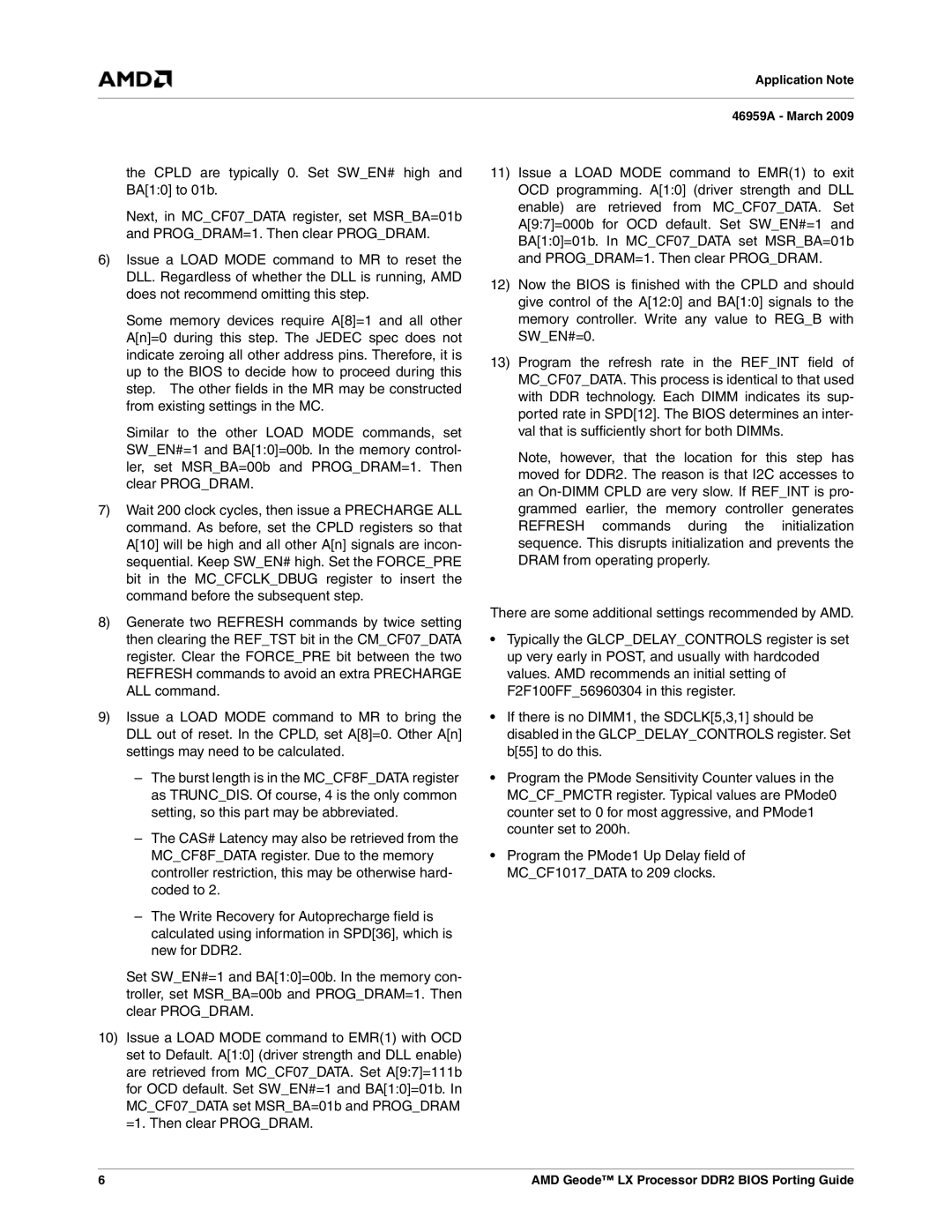
Application Note
the CPLD are typically 0. Set SW_EN# high and BA[1:0] to 01b.
Next, in MC_CF07_DATA register, set MSR_BA=01b and PROG_DRAM=1. Then clear PROG_DRAM.
6)Issue a LOAD MODE command to MR to reset the DLL. Regardless of whether the DLL is running, AMD does not recommend omitting this step.
Some memory devices require A[8]=1 and all other A[n]=0 during this step. The JEDEC spec does not indicate zeroing all other address pins. Therefore, it is up to the BIOS to decide how to proceed during this step. The other fields in the MR may be constructed from existing settings in the MC.
Similar to the other LOAD MODE commands, set SW_EN#=1 and BA[1:0]=00b. In the memory control- ler, set MSR_BA=00b and PROG_DRAM=1. Then clear PROG_DRAM.
7)Wait 200 clock cycles, then issue a PRECHARGE ALL command. As before, set the CPLD registers so that A[10] will be high and all other A[n] signals are incon- sequential. Keep SW_EN# high. Set the FORCE_PRE bit in the MC_CFCLK_DBUG register to insert the command before the subsequent step.
8)Generate two REFRESH commands by twice setting then clearing the REF_TST bit in the CM_CF07_DATA register. Clear the FORCE_PRE bit between the two REFRESH commands to avoid an extra PRECHARGE ALL command.
9)Issue a LOAD MODE command to MR to bring the DLL out of reset. In the CPLD, set A[8]=0. Other A[n] settings may need to be calculated.
–The burst length is in the MC_CF8F_DATA register as TRUNC_DIS. Of course, 4 is the only common setting, so this part may be abbreviated.
–The CAS# Latency may also be retrieved from the MC_CF8F_DATA register. Due to the memory controller restriction, this may be otherwise hard- coded to 2.
–The Write Recovery for Autoprecharge field is calculated using information in SPD[36], which is new for DDR2.
Set SW_EN#=1 and BA[1:0]=00b. In the memory con- troller, set MSR_BA=00b and PROG_DRAM=1. Then clear PROG_DRAM.
10)Issue a LOAD MODE command to EMR(1) with OCD set to Default. A[1:0] (driver strength and DLL enable) are retrieved from MC_CF07_DATA. Set A[9:7]=111b for OCD default. Set SW_EN#=1 and BA[1:0]=01b. In MC_CF07_DATA set MSR_BA=01b and PROG_DRAM =1. Then clear PROG_DRAM.
46959A - March 2009
11)Issue a LOAD MODE command to EMR(1) to exit OCD programming. A[1:0] (driver strength and DLL enable) are retrieved from MC_CF07_DATA. Set A[9:7]=000b for OCD default. Set SW_EN#=1 and BA[1:0]=01b. In MC_CF07_DATA set MSR_BA=01b and PROG_DRAM=1. Then clear PROG_DRAM.
12)Now the BIOS is finished with the CPLD and should give control of the A[12:0] and BA[1:0] signals to the memory controller. Write any value to REG_B with SW_EN#=0.
13)Program the refresh rate in the REF_INT field of MC_CF07_DATA. This process is identical to that used with DDR technology. Each DIMM indicates its sup- ported rate in SPD[12]. The BIOS determines an inter- val that is sufficiently short for both DIMMs.
Note, however, that the location for this step has moved for DDR2. The reason is that I2C accesses to an
There are some additional settings recommended by AMD.
•Typically the GLCP_DELAY_CONTROLS register is set up very early in POST, and usually with hardcoded values. AMD recommends an initial setting of F2F100FF_56960304 in this register.
•If there is no DIMM1, the SDCLK[5,3,1] should be disabled in the GLCP_DELAY_CONTROLS register. Set b[55] to do this.
•Program the PMode Sensitivity Counter values in the MC_CF_PMCTR register. Typical values are PMode0 counter set to 0 for most aggressive, and PMode1 counter set to 200h.
•Program the PMode1 Up Delay field of MC_CF1017_DATA to 209 clocks.
6 | AMD Geode™ LX Processor DDR2 BIOS Porting Guide |
